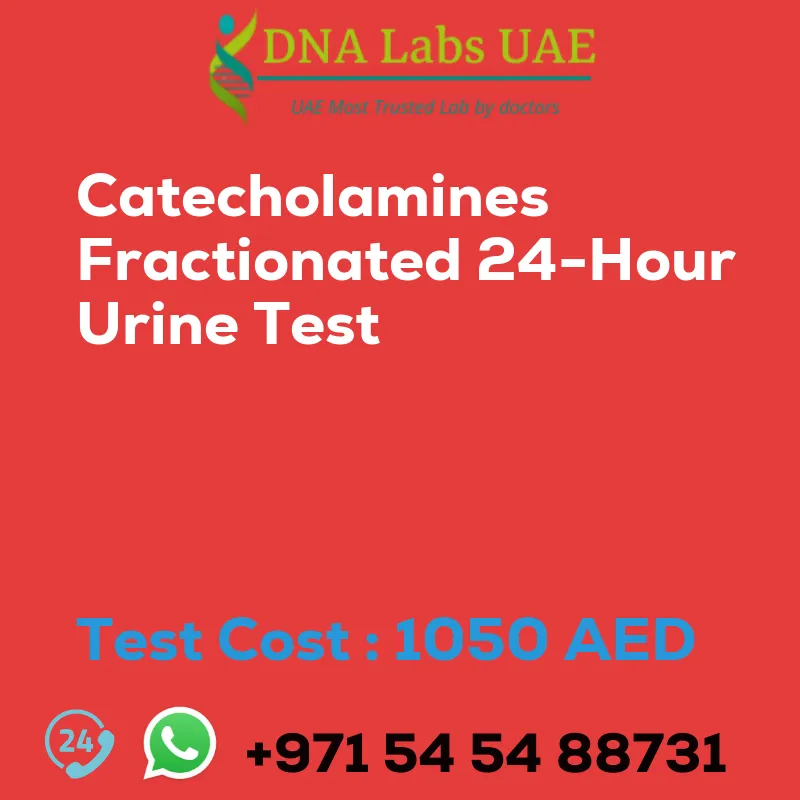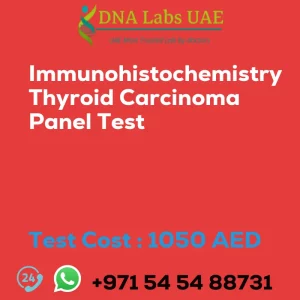CATECHOLAMINES FRACTIONATED 24-HOUR URINE Test
Test Cost: AED 1050.0
Test Components
- Epinephrine
- Norepinephrine
- Dopamine
Sample Condition: 50 mL (10 mL min.) aliquot of 24-hour urine. Collect urine with appropriate volume of 50% HCl to maintain pH between 1-2. Do not use concentrated HCl. Record 24-hour volume on test request form and urine container. Ship refrigerated or frozen. Patient should strictly avoid Alpha-one blockers, Aminophylline, Amphetamines, Ampicillin, Beta-blockers, Ephedrine, Imipramine, Methyldopa, MAO inhibitors, Nicotine, Phenacetin, Phenothiazine, Theophylline, Vasodilators, Aspirin, PAS, Alpha-2 agonists, Bromocriptine, Calcium channel blockers (long term use), Clofibrate, Propranolol, Penicillin, Reserpine, Thyroxine, Alpha-methyldopa, Isoproterenol, Labetalol, Mandelamine, Paracetamol, Cimetidine, Metoclopramide, vigorous exercise, alcoholic beverages, tea/coffee, and tobacco at least 72 hours before and during specimen collection.
Report Delivery: Sample Wed/Sat by 9 am; Report 2 days
Method: LC-MS/MS
Test Type: Cancer
Doctor: Oncologist, Physician
Test Department: HPLC
Pre Test Information
Patient should strictly avoid Alpha-one blockers, Aminophylline, Amphetamines, Ampicillin, Beta-blockers, Ephedrine, Imipramine, Methyldopa, MAO inhibitors, Nicotine, Phenacetin, Phenothiazine, Theophylline, Vasodilators, Aspirin, PAS, Alpha-2 agonists, Bromocriptine, Calcium channel blockers (long term use), Clofibrate, MAO inhibitors, Propranolol, Penicillin, Reserpine, Thyroxine, Alpha-methyldopa, Isoproterenol, Labetalol, Mandelamine, Paracetamol, Cimetidine, Metoclopramide, vigorous exercise, alcoholic beverages, tea/coffee, and tobacco at least 72 hours before and during specimen collection.
Test Details
The Catecholamines Fractionated 24-Hour Urine test is a diagnostic test used to measure the levels of catecholamines in a person’s urine over a 24-hour period. Catecholamines are a group of hormones and neurotransmitters that include adrenaline, noradrenaline, and dopamine. These substances are produced by the adrenal glands and play a role in regulating the body’s response to stress, as well as controlling blood pressure and heart rate.
This test is typically ordered to evaluate a person’s adrenal gland function and to diagnose conditions such as pheochromocytoma, a rare tumor that affects the adrenal glands and causes excessive catecholamine production. Symptoms of pheochromocytoma include high blood pressure, palpitations, sweating, and anxiety.
During the test, the patient collects all urine produced over a 24-hour period in a special container provided by the laboratory. The urine sample is then analyzed for levels of adrenaline, noradrenaline, and dopamine. The results of the test can help healthcare providers determine if there is an excess or deficiency of these hormones, which can aid in the diagnosis and management of various conditions.
It is important to follow specific instructions provided by the healthcare provider or laboratory when collecting the urine sample to ensure accurate results. Some medications and foods can interfere with the test, so it may be necessary to temporarily discontinue certain medications or avoid certain foods before the test.
Overall, the Catecholamines Fractionated 24-Hour Urine test is a valuable tool in assessing adrenal gland function and diagnosing conditions related to catecholamine imbalance. It helps healthcare providers make informed decisions regarding treatment and management plans for their patients.
| Test Name | CATECHOLAMINES FRACTIONATED 24-HOUR URINE Test |
|---|---|
| Components | *Epinephrine*Norepinephrine*Dopamine |
| Price | 1050.0 AED |
| Sample Condition | 50 mL (10 mL min.) aliquot of 24-hour urine. Collect urine with appropriate volume of 50% HCl to maintain pH between 1-2. Do not use concentrated HCl.Record 24 hour volume on test request form and urine container. Ship refrigerated or frozen. Patient should strictly avoid Alpha-one blockers, Aminophylline, Amphetamines, Ampicillin, Beta-blockers, Ephedrine, Imipramine, Methyldopa, MAO inhibitors, Nicotine, Phenacetin, Phenothiazine, Theophylline, Vasodilators, Aspirin, PAS, Alpha-2 agonists, Bromocriptine, Calcium channel blockers ( long term use), Clofibrate,Propranolol, Penicillin, Reserpine, Thyroxine, Alpha-methyldopa, Isoproterenol, Labetalol, Mandelamine, Paracetamol, Cimetidine, Metoclopramide, vigorous exercise,alcoholic beverages, tea\/coffee and tobacco at least 72 hours before and during specimen collection. |
| Report Delivery | SampleWed / Sat by9 am; Report 2 days |
| Method | LC-MS/MS |
| Test type | Cancer |
| Doctor | Oncologist, Physician |
| Test Department: | HPLC |
| Pre Test Information | Patient should strictly avoid Alpha-one blockers, Aminophylline, Amphetamines, Ampicillin, Beta-blockers, Ephedrine, Imipramine, Methyldopa, MAO inhibitors, Nicotine, Phenacetin, Phenothiazine, Theophylline, Vasodilators, Aspirin, PAS, Alpha-2 agonists, Bromocriptine, Calcium channel blocke( long term use), Clofibrate, MAO inhibitors, Propranolol, Penicillin, Reserpine, Thyroxine, Alpha-methyldopa, Isoproterenol, Labetalol, Mandelamine, Paracetamol, Cimetidine, Metoclopramide, vigorous exercise,alcoholic beverages, tea/coffee and tobacco at least 72 hours before and during specimen collection. |
| Test Details |
The Catecholamines Fractionated 24-Hour Urine test is a diagnostic test used to measure the levels of catecholamines in a person’s urine over a 24-hour period. Catecholamines are a group of hormones and neurotransmitters that include adrenaline, noradrenaline, and dopamine. These substances are produced by the adrenal glands and play a role in regulating the body’s response to stress, as well as controlling blood pressure and heart rate. This test is typically ordered to evaluate a person’s adrenal gland function and to diagnose conditions such as pheochromocytoma, a rare tumor that affects the adrenal glands and causes excessive catecholamine production. Symptoms of pheochromocytoma include high blood pressure, palpitations, sweating, and anxiety. During the test, the patient collects all urine produced over a 24-hour period in a special container provided by the laboratory. The urine sample is then analyzed for levels of adrenaline, noradrenaline, and dopamine. The results of the test can help healthcare providers determine if there is an excess or deficiency of these hormones, which can aid in the diagnosis and management of various conditions. It is important to follow specific instructions provided by the healthcare provider or laboratory when collecting the urine sample to ensure accurate results. Some medications and foods can interfere with the test, so it may be necessary to temporarily discontinue certain medications or avoid certain foods before the test. Overall, the Catecholamines Fractionated 24-Hour Urine test is a valuable tool in assessing adrenal gland function and diagnosing conditions related to catecholamine imbalance. It helps healthcare providers make informed decisions regarding treatment and management plans for their patients. |








